September, 15 2021 ( Updated May, 27 2024)
A land of a thousand surprises, Croatia is a combination of, breathtaking landscapes, wild nature and crystal clear waters. But don't overlook its unique cuisine either, as there are several local dishes that are well worth sampling.
Croatian cuisine is typical and traditional, yet cosmopolitan. It is influenced by the past, but also by introductions from outside the territory. The dishes are both meat and fish-based and cooked in a variety of special ways. Thus, land and sea come together to create delicious food in the traditionally rich land of Croatia.
So, let's discover these must-try Croatian delicacies that you should definitely eat on your next trip to Croatia!
Let's start with a very popular second course: Peka, a Croatian meat dish.
Peka is the name of the terracotta or cast-iron bell covered with glowing embers that are used to cook various meat such as lamb, veal, chicken and even octopus. The peka, in turn, keeps the flavours intact and makes the food very tender. What is even more interesting is that some houses in Dalmatia have a space dedicated to cooking this dish, especially in small villages!
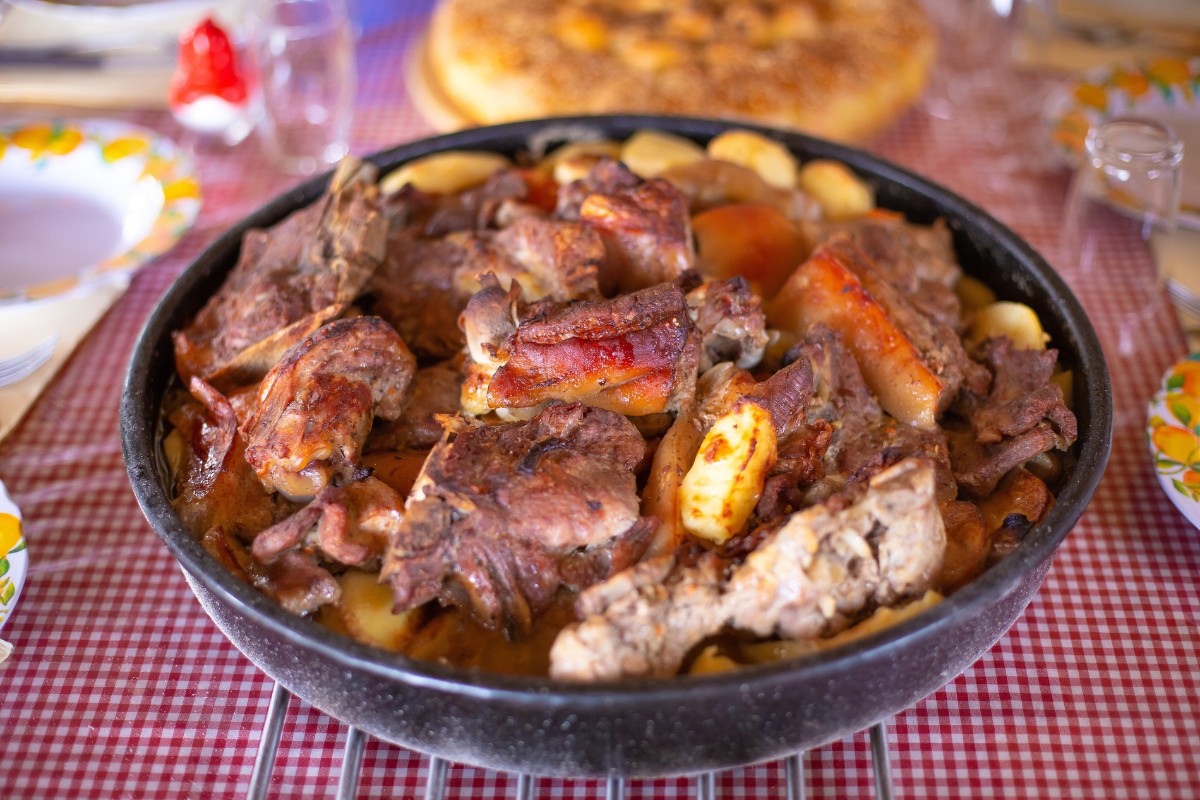 Lamb and potatoes cooked with Peka, a hearty Croatian dish
Lamb and potatoes cooked with Peka, a hearty Croatian dish
For those who love street food, we recommend Ćevapčići - small, elongated meatballs made of spiced mixed meat (usually beef and lamb). Although Ćevapčići originated in Bosnia, it is not difficult to taste them whether you are on the streets of Croatia or in restaurants. Meatballs are served with paprika, fresh onion and a spicy sauce called ajvar, made from pepper. The meat is cooked on the grill, griddle or BBQ.
 Ćevapčići, typical Croatian street food, usually eaten with ajvar, a spicy sauce
Ćevapčići, typical Croatian street food, usually eaten with ajvar, a spicy sauce
Very similar to Ćevapčići, Pljeskavica is another typical croatian food: a delicious patty of minced meat (beef and lamb), it’s served with ajvar and chopped raw onion and even with lepinja flatbread and a side of chips. A must try for every street food aficionado!
Another typical croatian food a Dalmatian dish Pašticada, which is considered suitable for special occasions, perhaps because of its long and laborious preparation. This is a stew of meat, usually beef, which is soaked in vinegar and then cooked in a red wine sauce. A rich dish accompanied by the typical Croatian njoki (gnocchi). To give it even more flavour, dried fruit (plums or figs) and various spices such as bay leaves, nutmeg and cloves are usually added.
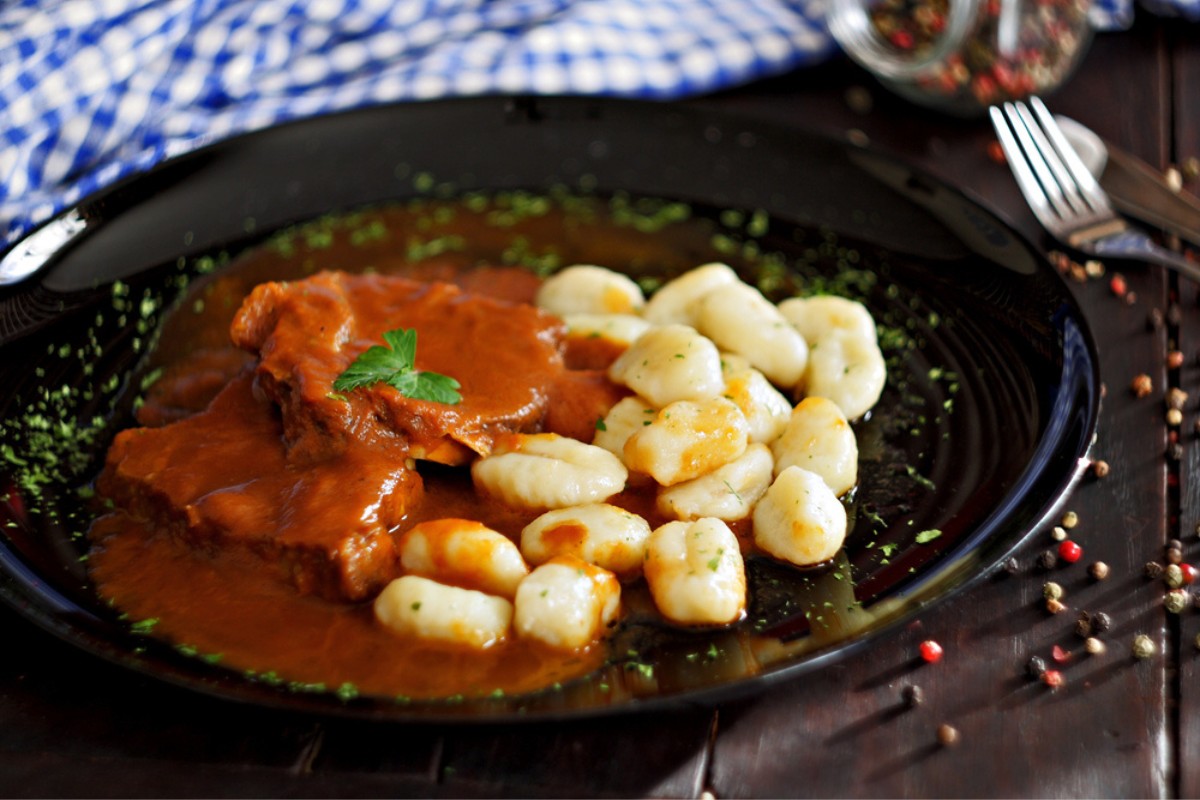 Pasticada, an elaborate meal for special occasions
Pasticada, an elaborate meal for special occasions
A typical first course in Croatian cuisine is Crni Rizot, which is also one of the trademark Croatian fish dish of Dalmatia. In this land, risotto is the base for many dishes, and there are many variations, but crni rizot is the one that has gained popularity all over the world. This risotto is easily recognisable by its black colour given by the ink of the squid or of a cattlefish, making a dish of simple and rooted tradition, now extremely refined and delicious.
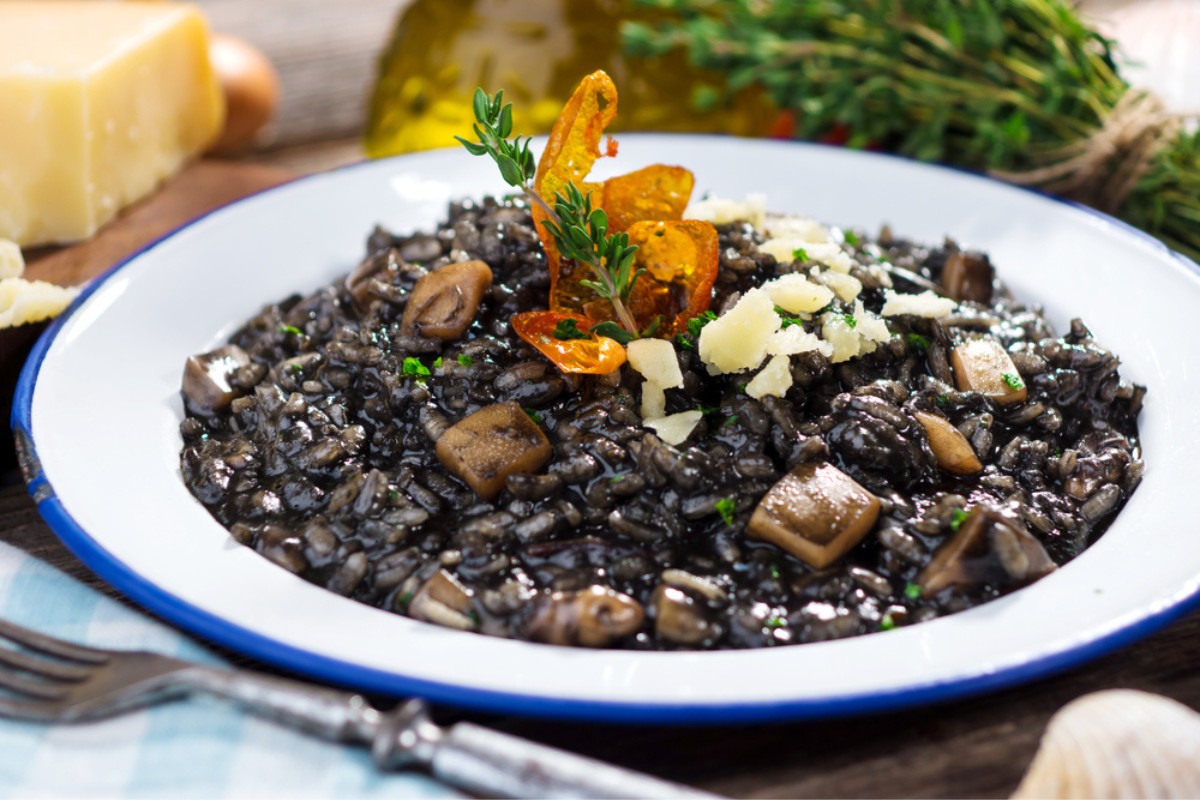
Crni rizot or black risotto topped with parsley and cheese
Tip: If you are crazy about pasta, you need to try the Croatian pasta, especially Fuži and Pljukanci. Fuži is homemade fresh a quill-shaped pasta often served with a truffle cream sauce or red meat sauces including beef, boškarin, chicken, rooster or wild game. The fresh, chewy, hand-rolled spindle-shaped pasta, pljukanci, are also very much enjoyed.
Another seafood delicacy is Brudet or fish stew. It is found in many parts of the world and has a lot of variations. In Croatia, it is especially popular as a soup with mussels, langoustines and monkfish, with the addition of onions or using tomato as a base. In some areas, it is cooked with lobster, eel or frog, so there is something for everyone!
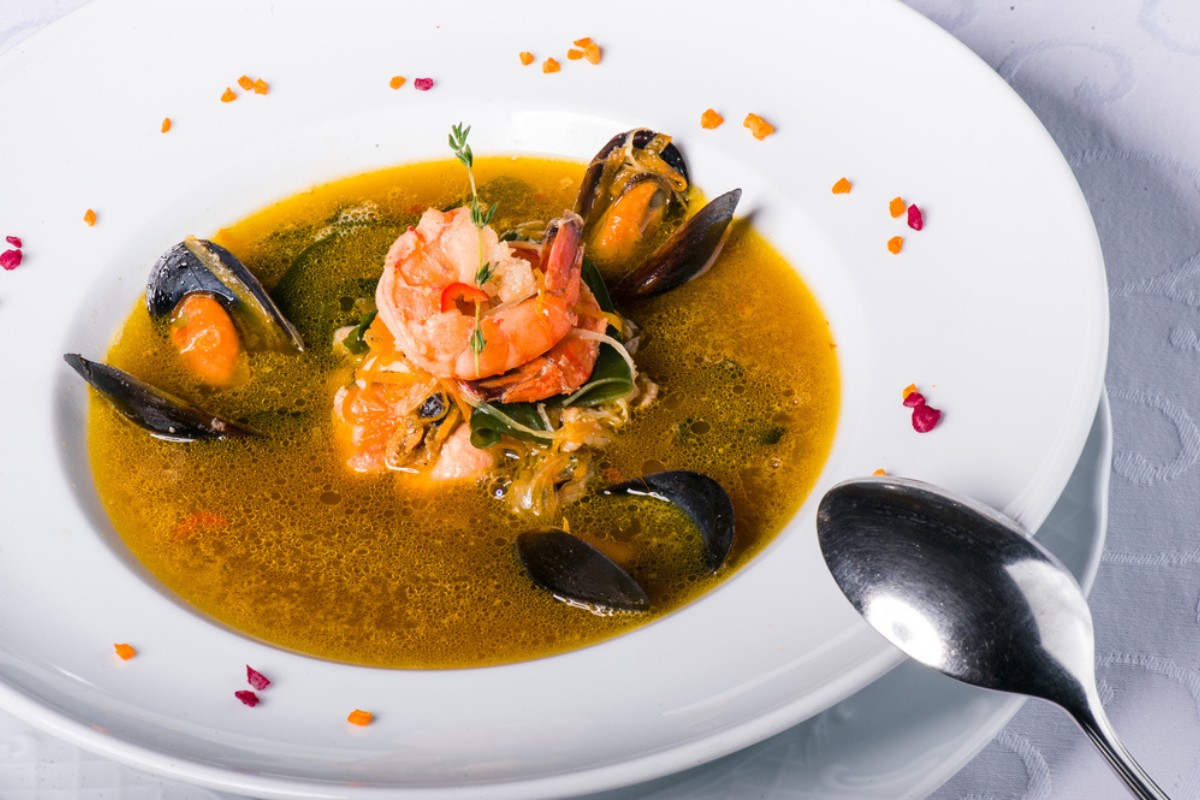 Delicious Croatian fish stew, Brudet
Delicious Croatian fish stew, Brudet
Another kind of fish stew is the tasty fiš paprikaš, which is cooked in a caldron over an open fire and seasoned with paprika. Common ingredients are freshwater fish like catfish, carp, and pike. In some Croatian regions it’s served with egg noodles. A real gastronomy experience!
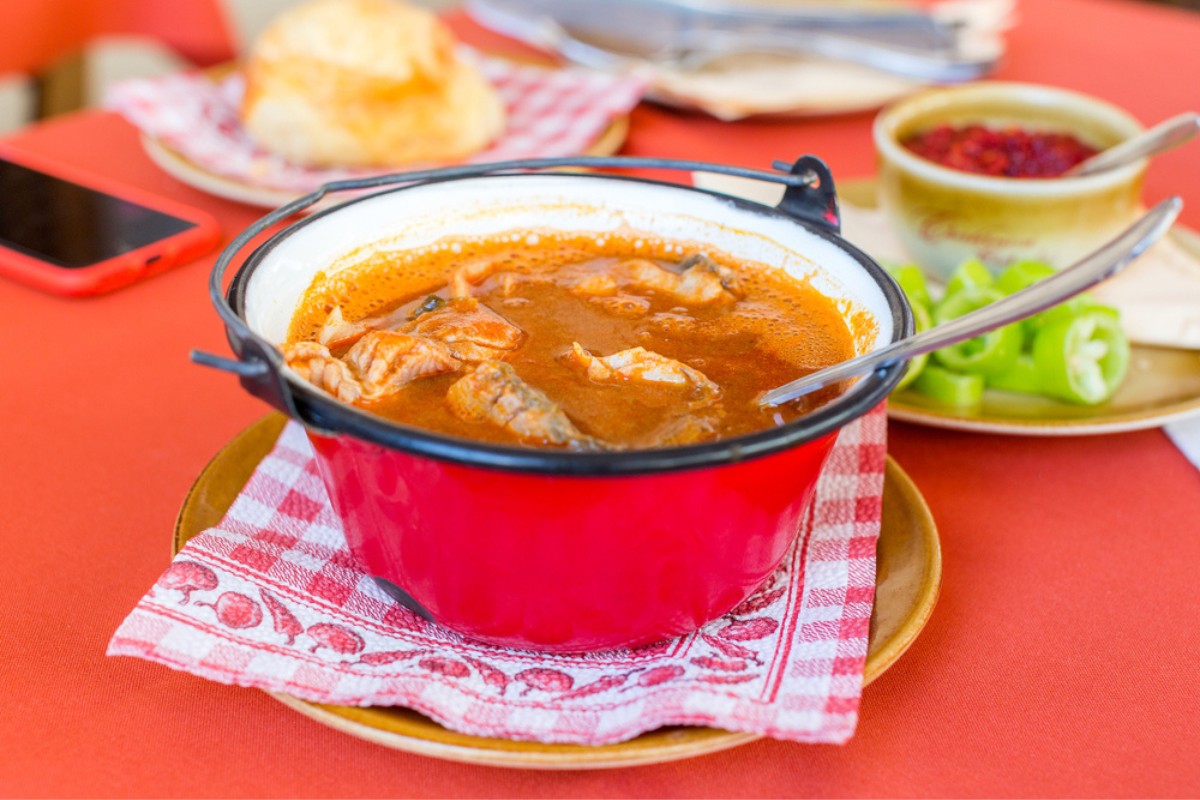 The delicious winter comfort food, Fiš Paprikaš
The delicious winter comfort food, Fiš Paprikaš
Salata od hobotnice or octopus salad is eaten during summer since there is an abundance of fresh octopus. The octopus is boiled until it’s tender, then once cold, is chopped and mixed with onions, capers, parsley. Someone likes to add also tomatoes and/or boiled patatoes. At the end everything is tossed in a dressing made of olive oil (Istrian olive oil is one of the best) vinegar or lemon, salt, pepper and garlic. A perfect dish for summer dinners!
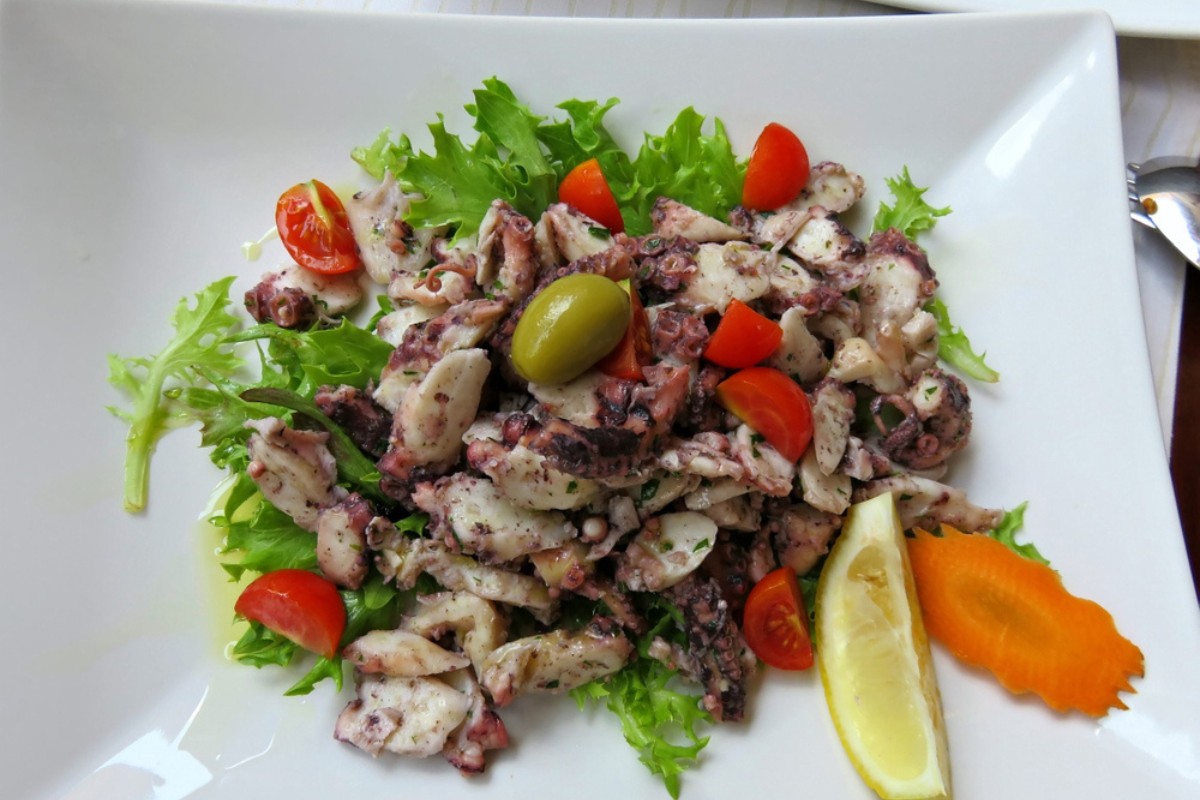 In summer, try the delicious Salata od Hobotnice
In summer, try the delicious Salata od Hobotnice
Also known as the Istrian ox, the Boškarin is considered a gourment delicacy and a traditional Croatian food served in a variety of ways such as carpaccio, salami, steak etc.
A common appetizer, usually served with cheese (pršut i sir), is the Istrian ham or Pršut.
Made of a skinned pork leg, dry-salted with sea salt and seasoned with pepper and garlic and then air cured for at least 12 month with the northen wind of the Bura that give it its unmistakable aroma.
Among the must-try Croatian dishes, Kulen is typical of Slavonia, a Croatian eastern region, it’s a tasty smoked pork sausage seasoned with paprika and garlic. A real national treasure!
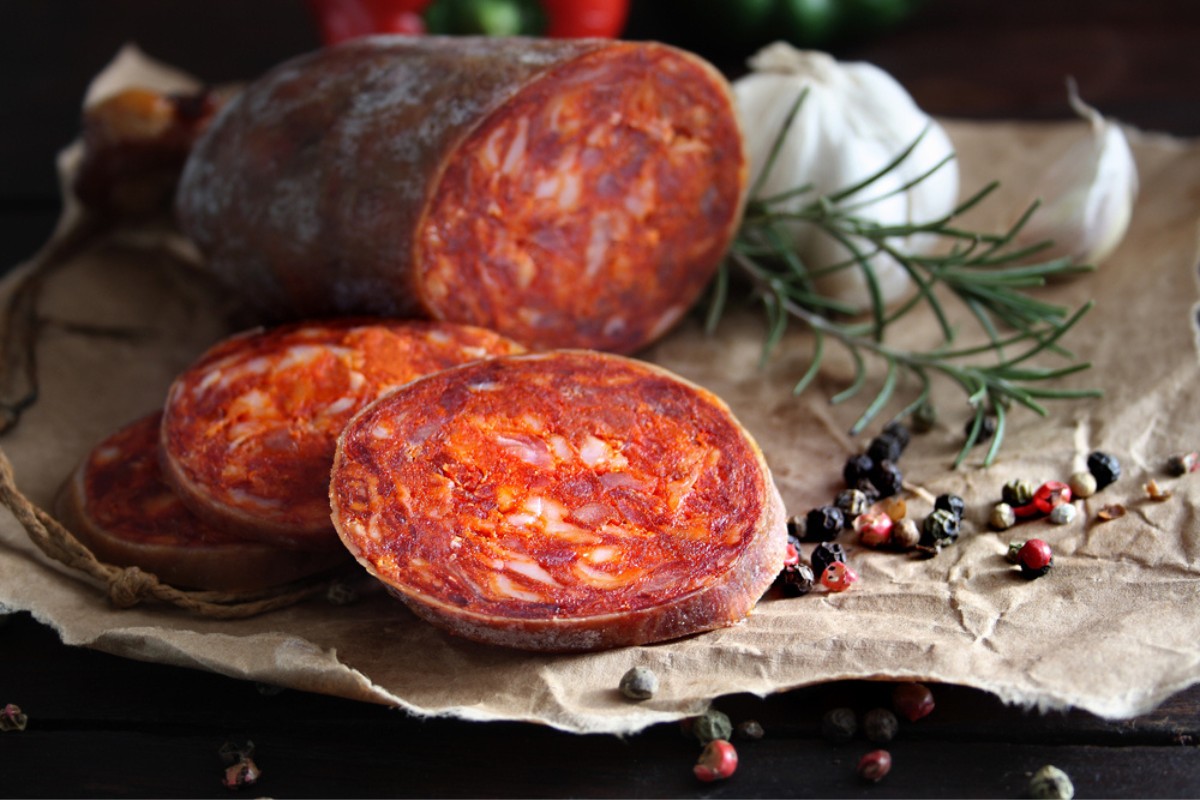 Spicy kulen, the must-try Croatian salami
Spicy kulen, the must-try Croatian salami
Well, in that case, try the visually stunning Medimurska Gibanica. This four-layered pastry with apples, walnuts, cottage cheese and poppy seeds packs in it a whole bunch of flavours that will definitely sum up Croatian desserts!
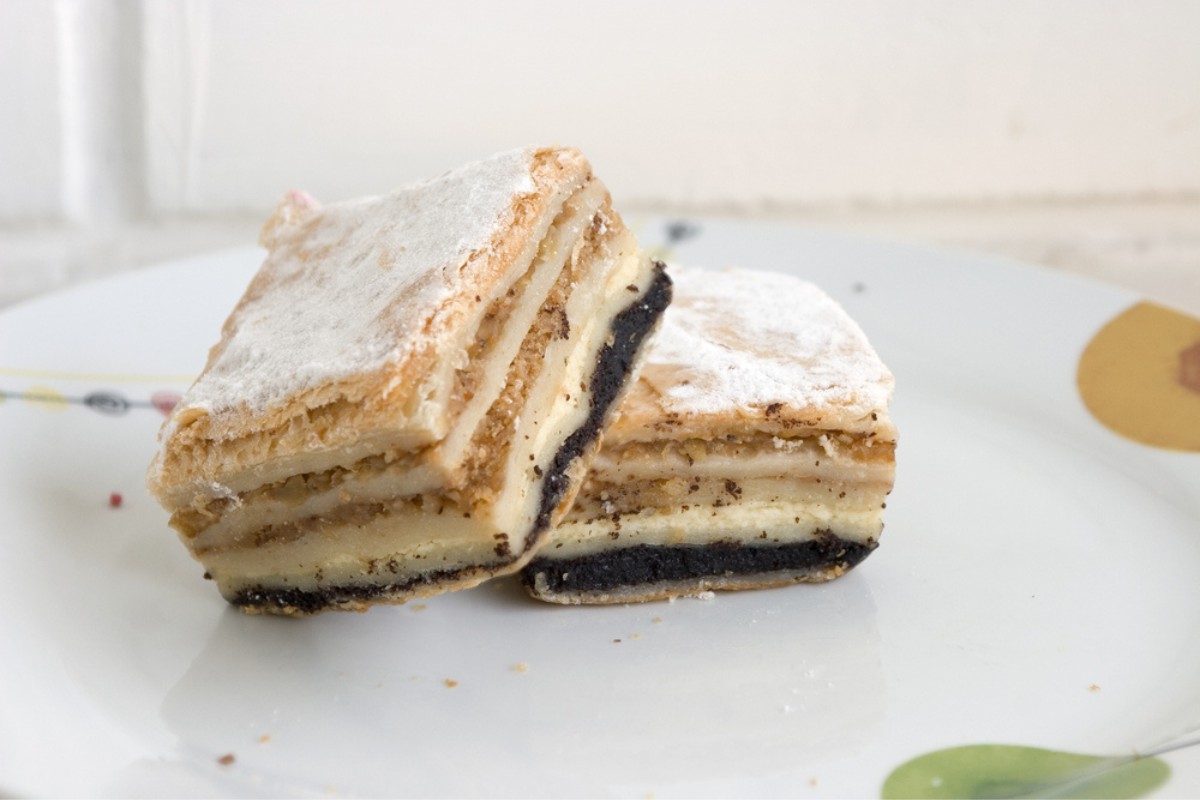 Medimurska Gibanica, a typical croatian dessert
Medimurska Gibanica, a typical croatian dessert
Very popular during the holidays, fritule are made with fried dough which can be flavoured with egg yolks, raisins, grated lemon or orange rinds, and even rakija or rum. A must try for sure!
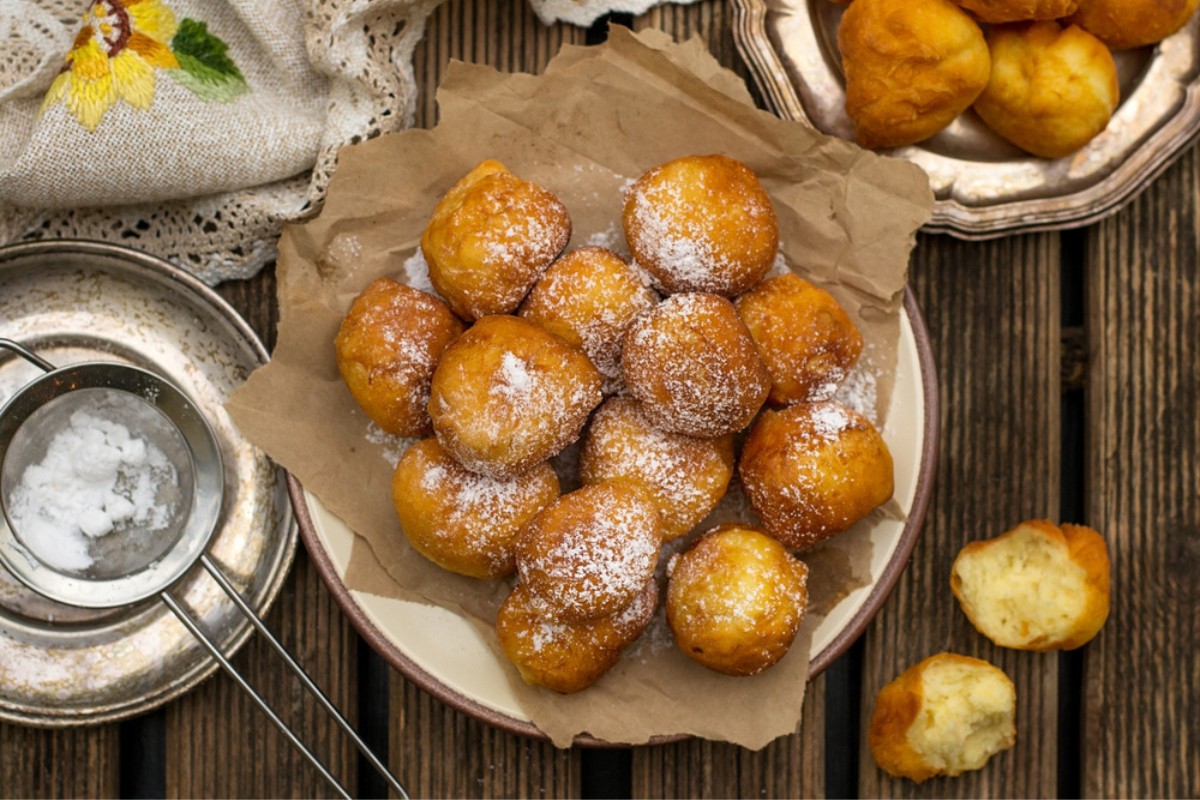 Fragrant fritule, a delightfully airy Croatian dessert
Fragrant fritule, a delightfully airy Croatian dessert
Croatia is also well known for wines, some of the most famous wines are Istria’s Malvazija and Teran. Malvazija is a light white that pairs well with fish and seafood dishes while Teran is a roboust red wine ideal for meat dishes. But what to drink after an earthy meal? Rakja is the answer! This distilled spirit, who comes in several flavours, is symbol of hospitality and locals drink it before and after meals.
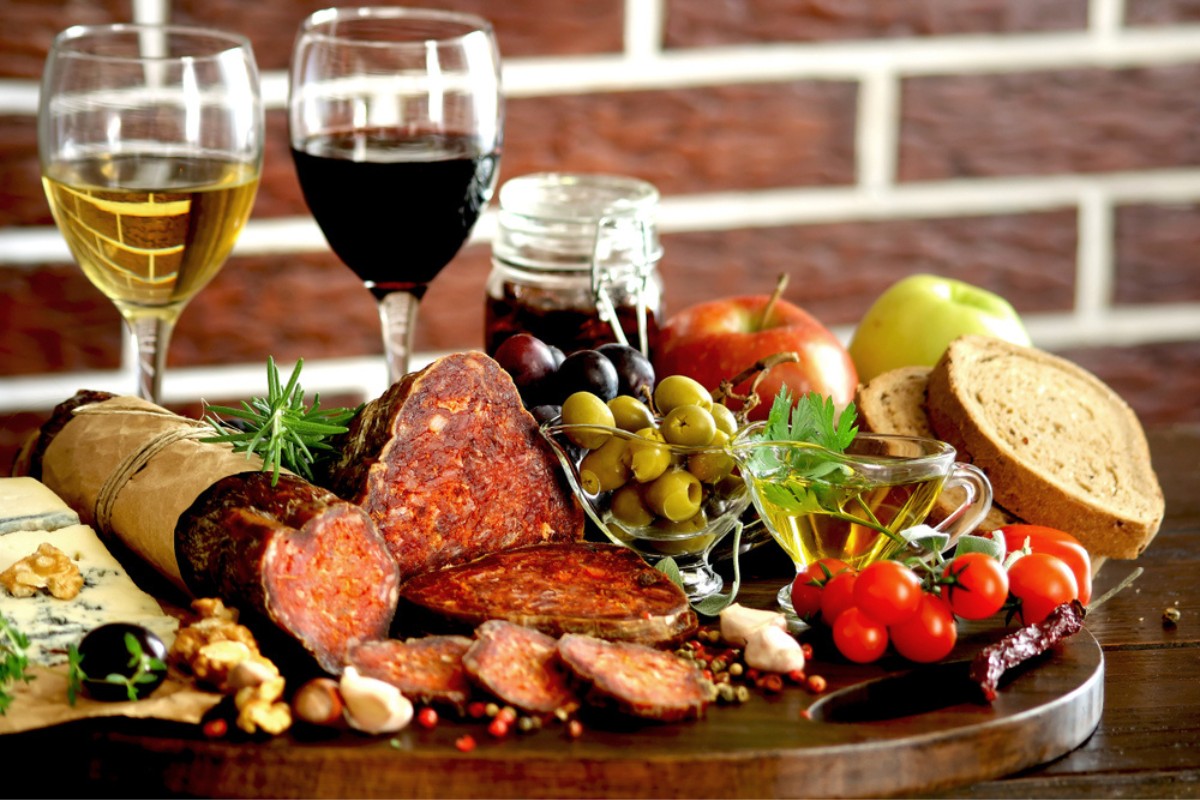 Charcuterie and cheese board accompanied by Croatian wine
Charcuterie and cheese board accompanied by Croatian wine
In Croatia, cheese is usually served as a starter or as a dessert. From the Pag island comes the famous Paški Sir (Pag cheese). This sheep’s cheese has a similar texture to Parmesan’s and is a staple of Croatian cusine!
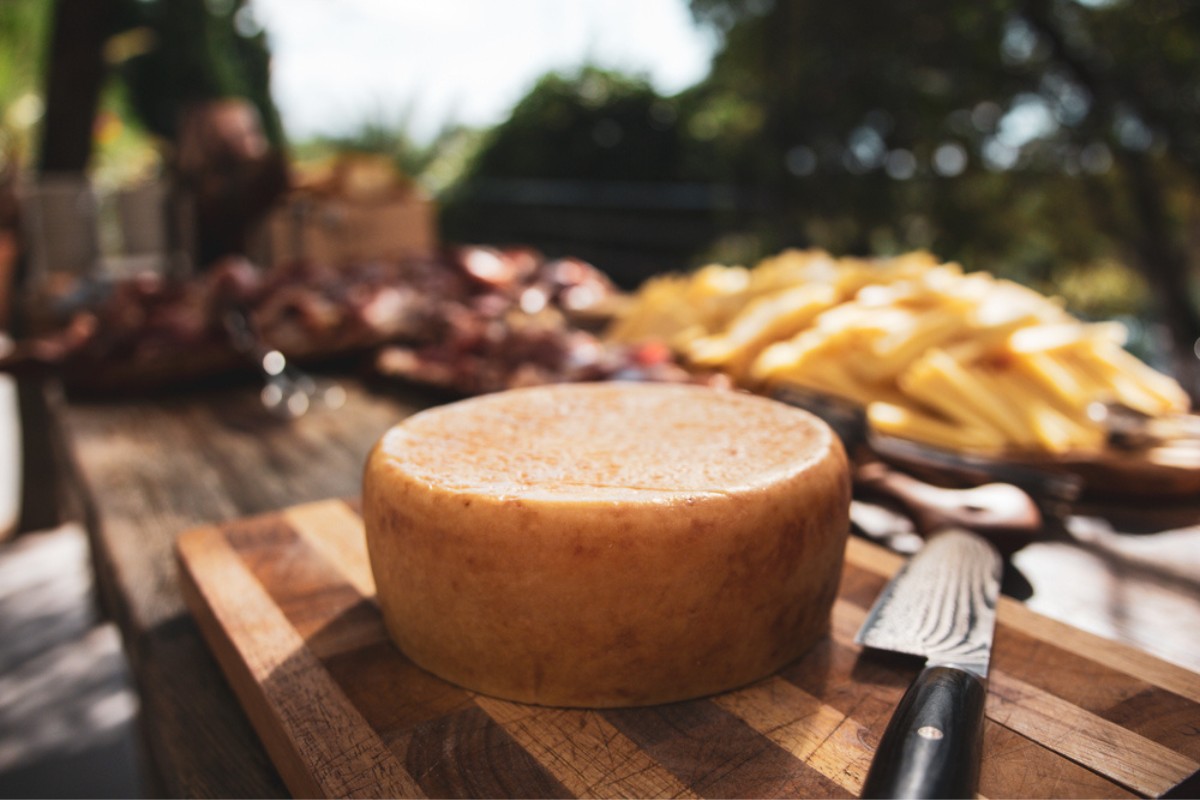 A real symbol of Croatian food, the delicious Paški sir
A real symbol of Croatian food, the delicious Paški sir
From the leftover whey after the production of the Paški sir, is made Paška skuta, a fresh and soft ricotta cheese with a mild flavour usually served with fresh fruit or used in desserts. Another typical cheese is Škripavac, a soft gummy cow-milk cheese that you can eat on its own or grilled.
A cuisine of simple and rich traditions is often adapted in a more elaborate way to make up modern Croatian cuisine. So, if you are staying in Croatia, you must try these delicacies!
Looking for a suitable holiday home to accompany your Croatian food tour? Book with us!
Read more
Zadar: the Croatian city that will surprise you with its art and culture
Šibenik: the seaside city of UNESCO-protected history
Plitvice Lakes: visiting a Croatian winter wonderland
Digital Nomads in Croatia: a full guide for first-time digital nomads in Croatia
join over 80,000 who receive our updates